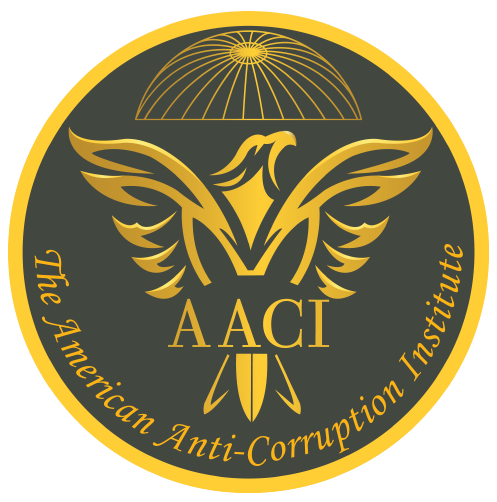Anti-Corruption Intelligence
Anti-Corruption Intelligence
By Mike Masoud – Published by The American Anti-Corruption Institute (AACI), October 3, 2017
Introduction
Decision makers face increasing pressure to act with integrity and foresight in the complex and evolving governance, compliance, and ethical leadership landscape. In 2017, The American Anti-Corruption Institute (AACI) introduced the concept of Anti-Corruption Intelligence as a groundbreaking framework to equip leaders with the minimum, optimum knowledge required to deter and prevent corruption and fraud intelligently. This concept offers more than awareness—it provides a proactive structure to guide ethical and strategic choices across public, private, and nonprofit sectors.
The Concept
Anti-Corruption Intelligence is defined as:
“The minimum, optimum knowledge a decision maker should have to avoid fraud and corruption intelligently. Such knowledge includes the proper blend of due diligence, internal control, anti-corruption, governance, decision making, andprocess auditing (from a management perspective and duties) to avoid corruption and fraud. By avoidance, we emphasize the concept of deterrence and prevention. Corruption prevention is less expensive and better than any cure.”
— First published in The First Interview with Mr. L. B. Files, October 3, 2017
Anti-Corruption Intelligence is not about data collection, nor is it equivalent to law enforcement surveillance. It is a comprehensive and preventive knowledge framework that empowers those in positions of authority to navigate their duties with ethical clarity, risk sensitivity, and strategic foresight.
This intelligence is actionable and interdisciplinary. It draws from governance, internal control systems, risk management, and leadership ethics to shape how decisions are made and institutions are led. The framework emphasizes that avoiding corruption is not accidental—it is the result of informed, structured, and institutionalized decision making practices.
Strategic Importance
The traditional models of compliance and audit are often reactive—triggered by violations, investigations, or reputational damage. Anti-Corruption Intelligence introduces a shift toward strategic prevention, where decision makers are equipped to anticipate vulnerabilities and design safeguards before risks materialize.
The concept is particularly vital in:
- High-stakes procurement and public contracting
- Regulatory oversight and licensing
- Strategic planning and budgeting
- Leadership selection and organizational restructuring
- Integrity-based partnerships and international development projects
Through this framework, institutions move from a posture of damage control to proactive risk deterrence—enhancing credibility, reducing financial losses, and strengthening public trust.
Originality and First Use
A thorough investigation of global literature and public archives confirms that The AACI was the first to formally define and publish the concept of Anti-Corruption Intelligence on October 3, 2017, in its interview with Mr. L. B. Files, President of The AACI.
While references to “anti-corruption intelligence” exist in law enforcement and national security contexts (e.g., police anti-corruption units), these are fundamentally different in intent and structure. None of them articulated or operationalized the concept as a knowledge-based framework for decision makers to prevent corruption through internal control, due diligence, and governance literacy.
As such, The AACI holds the intellectual leadership in defining and promoting this original concept.
Application Across Institutions
The integration of Anti-Corruption Intelligence is critical across sectors:
- Government institutions can embed it into civil service training, policy formulation, and public financial management.
- Corporations can adopt it to guide boardroom decisions, mergers and acquisitions, and supply chain transparency.
- Nonprofits and development agencies can use it to design grant programs and partnership screening tools with built-in corruption safeguards.
- Academic institutions can incorporate it into leadership, law, governance, and public policy curricula to prepare future decision makers.
In all cases, Anti-Corruption Intelligence ensures that integrity is not left to chance—it is consciously built into how institutions are structured and decisions are made.
Alignment with The AACI’s Principles
This concept embodies multiple elements of The AACI’s Ten Principles of Fighting Corruption, especially:
- Effective internal control
- Effective and good governance
- Independent and effective judiciary
- Investment in corruption prevention
- Power and accountability
- The pervasiveness of the rule of law
By promoting this knowledge-based approach, The AACI empowers leaders to confront corruption not just through enforcement—but through foresight, structure, and informed leadership.
Closing Statement
Anti-Corruption Intelligence is both a framework and a challenge. It demands that leaders become not just aware of corruption risks—but strategically prepared to prevent them. It replaces passivity with preparation, reaction with anticipation, and superficial compliance with substantive integrity.
As institutions across the globe seek to rebuild trust, protect resources, and lead with accountability, this concept offers a powerful foundation for sustainable governance and ethical decision making.
For Further Engagement
To explore how your institution can apply Performative Integrity or to request a briefing or presentation, please contact:
info@theaaci.com
Learn more about The Ten Principles of Fighting Corruption:
https://www.theaaci.net/Principles-of-Fighting-Corruption
Subscribe to The AACI Dispatch:
https://www.linkedin.com/newsletters/the-aaci-dispatch-7321647166328827904/
Copyright and Rights Management
© 2025 MOH'D J.J. Masoud (also known as Mike J. Masoud). All rights reserved.
Published by The American Anti-Corruption Institute under a non-exclusive license.
No part of this work may be reproduced, distributed, or used in any form without prior written authorization from The AACI.
For inquiries, contact: info@theaaci.com
